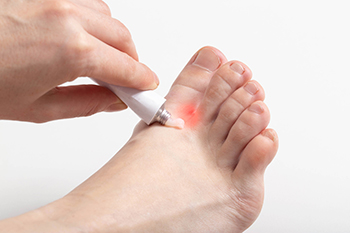 Athlete's foot, or tinea pedis, is a common fungal infection affecting the skin on the feet. It typically causes a red, itchy, and scaly rash, often starting between the toes. The condition thrives in warm, moist environments, making locker rooms, swimming pools, and communal showers common places for contraction. Athlete's foot occurs when the fungus comes into contact with the skin and finds favorable conditions to grow, such as damp socks or shoes. Symptoms include itching, burning, peeling skin, and in severe cases, blisters or ulcers. For mild cases of athlete's foot, antifungal creams, powders, or sprays may be effective. Keeping feet clean and dry is essential, as is changing socks regularly and wearing breathable footwear. Preventative measures include using shower sandals in public areas, thoroughly drying feet after washing, and avoiding sharing towels or shoes. If symptoms of athlete's foot persist or worsen despite treatment, it is suggested that you schedule an appointment with a podiatrist.
Athlete's foot, or tinea pedis, is a common fungal infection affecting the skin on the feet. It typically causes a red, itchy, and scaly rash, often starting between the toes. The condition thrives in warm, moist environments, making locker rooms, swimming pools, and communal showers common places for contraction. Athlete's foot occurs when the fungus comes into contact with the skin and finds favorable conditions to grow, such as damp socks or shoes. Symptoms include itching, burning, peeling skin, and in severe cases, blisters or ulcers. For mild cases of athlete's foot, antifungal creams, powders, or sprays may be effective. Keeping feet clean and dry is essential, as is changing socks regularly and wearing breathable footwear. Preventative measures include using shower sandals in public areas, thoroughly drying feet after washing, and avoiding sharing towels or shoes. If symptoms of athlete's foot persist or worsen despite treatment, it is suggested that you schedule an appointment with a podiatrist.
Athlete’s foot is an inconvenient condition that can be easily reduced with the proper treatment. If you have any concerns about your feet and ankles, contact Edward Sharrer, DPM from Premier Foot and Ankle Clinic. Our podiatrist will treat your foot and ankle needs.
Athlete’s Foot: The Sole Story
Athlete's foot, also known as tinea pedis, can be an extremely contagious foot infection. It is commonly contracted in public changing areas and bathrooms, dormitory style living quarters, around locker rooms and public swimming pools, or anywhere your feet often come into contact with other people.
Solutions to Combat Athlete’s Foot
- Hydrate your feet by using lotion
- Exfoliate
- Buff off nails
- Use of anti-fungal products
- Examine your feet and visit your doctor if any suspicious blisters or cuts develop
Athlete’s foot can cause many irritating symptoms such as dry and flaking skin, itching, and redness. Some more severe symptoms can include bleeding and cracked skin, intense itching and burning, and even pain when walking. In the worst cases, Athlete’s foot can cause blistering as well. Speak to your podiatrist for a better understanding of the different causes of Athlete’s foot, as well as help in determining which treatment options are best for you.
If you have any questions please feel free to contact our office located in North Little Rock, AZ . We offer the newest diagnostic and treatment technologies for all your foot and ankle needs.



